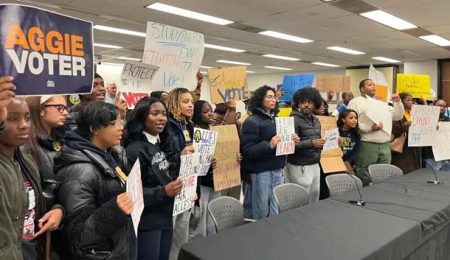News from NC’s General Assembly – October 2015

Photo: Urban News
By Nelda Holder –
The North Carolina General Assembly did not leave town very quietly when the 2015 session ended just after 4 a.m. on Wednesday, September 30.
Or, perhaps the individual representatives left quietly, but a series of bills that were passed in the overtime period between July and the final gavel caused a lot of noise all over the state that is not likely to die away quickly.
Indeed, so much opposition was raised quickly to a last-minute plan to eliminate certain powers of municipal and county governments affecting such issues as housing and employment discrimination or raising the minimum wage that this add-on language to a counseling-requirements bill, SB 279, was removed for the session.
The original bill, which changes educational requirements for “licensed professional counselor associate” and requires local boards of education to address sex trafficking prevention and awareness, was then passed.
Another controversial bill affecting environmental protection edged its way through, despite heavy lobbying against it. The Regulatory Reform Act of 2015 (HB 765), which started out as a 207-word bill of “technical corrections” to environmental law regarding the safe hauling of rock, gravel, or sand had mushroomed to 58 pages of changes to the state’s environmental law.
One of the more frequently cited provisions allows corporations that self-report certain violations to be exempt from penalties, and to withhold report information from the public. At press time, Gov. Pat McCrory had not signed HB 765, but it might become law without his signature.
A late plan to shift certain public school funds to charter schools (HB 539) was put on hold in the Committee on Rules, Calendar and Operations of the House.
Beware the Ides of March!
And get ready for March 15, 2016. North Carolina will now be holding both a presidential primary and the general primary election on that date, as a result of last-minute passage of HB 373. Controversy swirling around this bill highlighted a provision that will allow the legislative leader of each party caucus in the House and Senate to run what is deemed an “affiliated party committee.” This means legislative leaders will handle donations to candidates of their choice, which in turn means they can also receive donations to be distributed. (The law as finally passed includes a provision that those leaders may not receive candidate donations from lobbyists during the legislative session.)
With regard to voting: November 3 is general election day for contests in municipal elections across the state. In Asheville, Early Voting begins Thursday, October 22, at the Board of Elections, 77 McDowell Street. Remote sites open Saturday, October 24 (closed Sunday, October 25) and are open Monday-Saturday, October 26-31. For complete early voting information, call Election Services at 250-4200, or visit the website at www.buncombecounty.org/Governing/Depts/election/News_Detail.aspx?newsID=15913].
Note that the federal lawsuit regarding voting law changes in the state is still pending in the U.S. District Court for the Middle District of North Carolina. The case has been heard; the trial judge is expected to rule by the end of this year. To vote in the November, 2015 election, photo identification is not required. If the legislation requiring ID is upheld by the court, photo ID will be required hereafter, beginning with the March 15, 2016 primary.
Get used to it
- Political party affiliations must now be listed for the currently nonpartisan election of candidates for the NC Court of Appeals (HB 8).
- Federal waivers that permit food stamps to be made available for childless, non-disabled adults will not longer be allowed in the state, under HB 318, the “Protect North Carolina Workers Act.” (Federal law allows waivers based on unemployment levels and poverty rates; seventy-seven of NC’s 100 counties have already applied for the waivers this year, according to this report.)
- Tighter reins were placed on acceptable identification documents for establishing a person’s actual identity or residency, eliminating certain consular or embassy documents other than a valid passport. This is also through HB 318, which also requires additional e-verification for some government contracts.
- Local governments (county and city), again through HB 318, may not act as “sanctuary cities by, among other things, establishing policies that “prohibit law enforcement agencies” from gathering citizenship or immigration status information.
- Funding cuts to Legal Aid of North Carolina, made in last year’s budget ($1.4 million), were not restored as anticipated, resulting in a loss of some 45 of 300 positions statewide. Legal Aid has a primary client base of 125 percent of federal poverty guidelines. (Pending federal cuts may double this loss of positions.)
- Funding has been eliminated for family planning services, pregnancy prevention services, and adolescent parenting program for any provider that performs abortions (read: Planned Parenthood) under HB 297.
Read Nelda Holder’s blog, www.politicallypurplenc.com







